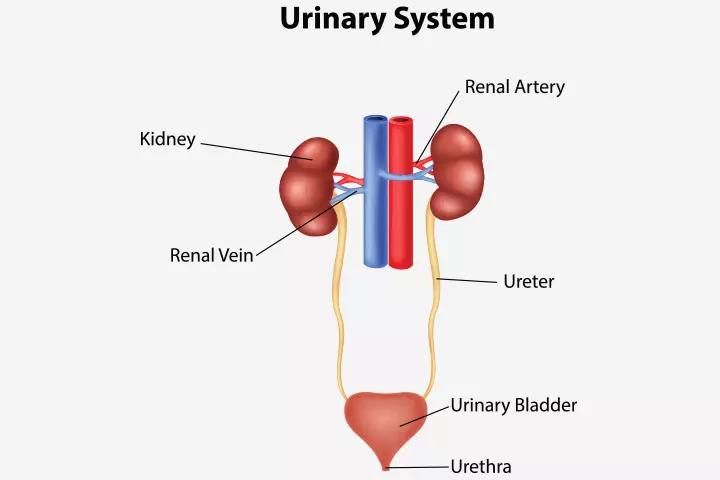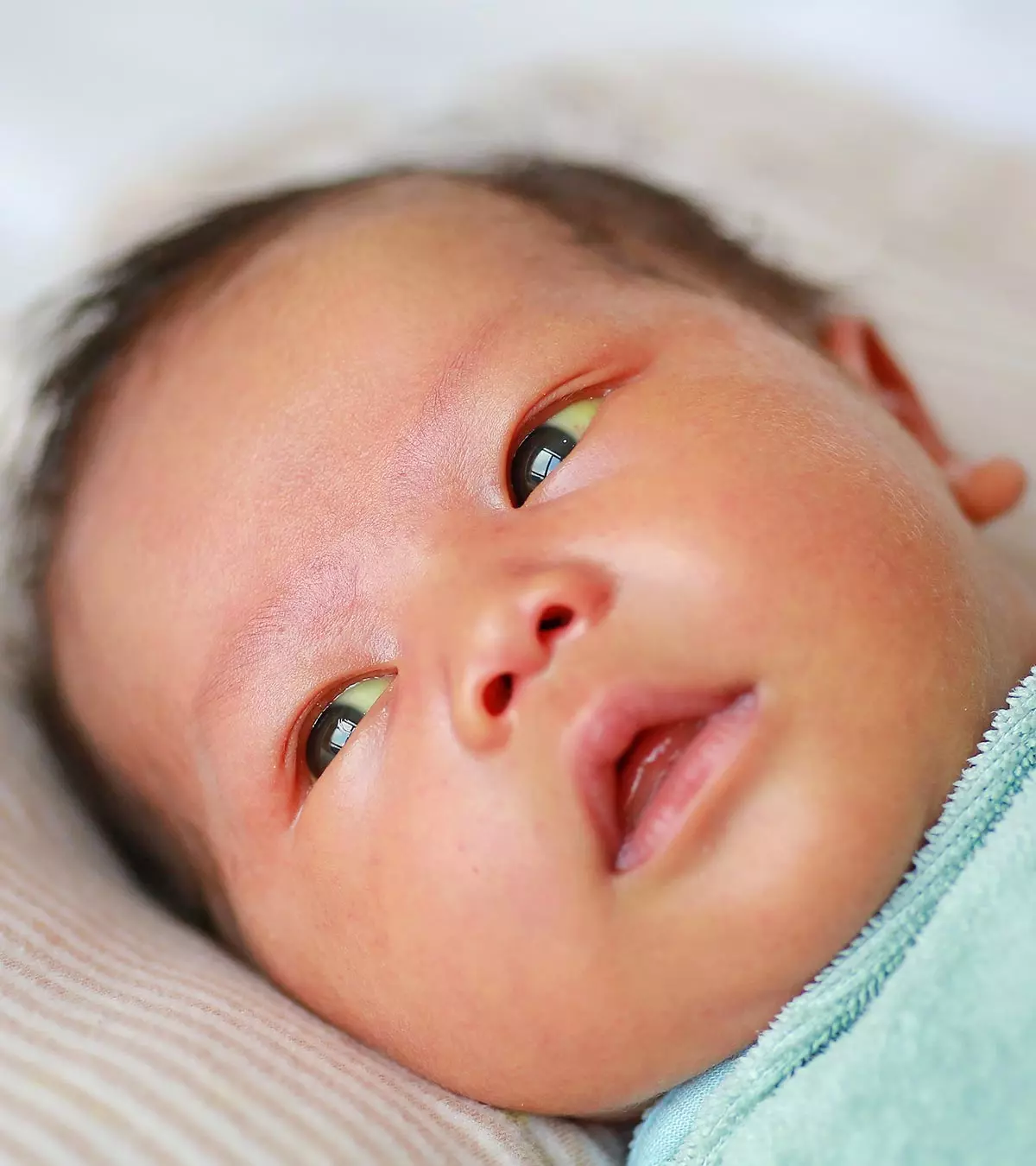

Image: Shutterstock
Acute polynephritis or kidney infection while pregnant is a type of urinary tract infection that spreads from the bladder to the kidneys. The infection affects about two percent of pregnant women and may involve one or both kidneys. It is often caused by a bacterial infection that causes the kidneys to inflame, which can have adverse complications if left untreated.

Timely detection and treatment of kidney infection are essential to maintain the mother and baby’s health (1). Read on to know more about the causes, symptoms, complications, treatment, and prevention of kidney infection during pregnancy.
What Causes Kidney Infections In Pregnancy?
The likelihood of kidney infections can be increased in pregnant women due to mechanical and hormonal changes in the body. Women are more vulnerable to acute pyelonephritis during second and third trimesters (2). Up to 40% of women with untreated asymptomatic bacteriuria develop pyelonephritis during pregnancy (3).
The infection is usually caused by the bacteria Escherichia coli (E. coli) that travel through the urethra to the bladder and then to the kidneys. The other bacteria that can cause urinary tract infection are Klebsiella pneumoniae, Proteus mirabilis, or Staphylococcus (4).
Image: IStock
The following factors may increase the risk of kidney infections in pregnancy (5) (6):
- The distended pregnant belly may cause difficulties in hygiene. Also, the infections pass more easily into a woman’s body than into a man’s, because of the short urethra, which is close to the anal opening. This leads to the easy transfer of bacteria from the rectal matter at the anal opening to the urethra.
- Kidney enlargement: High concentration of progesterone hormone secreted during pregnancy causes dilation of ureters, slowing down the flow of urine, leading to its accumulation in the bladder. It causes the kidneys to enlarge and gives time for the bacteria to multiply and trigger the infection.
- Compression of the ureters and bladder: The growing uterus puts pressure on the ureters and the bladder, making it difficult for the urine to flow.
- Increased pH of urine and glycosuria (excess sugar in the urine) enhances bacterial growth during pregnancy.
- Excretion of estrogen through urine is increased in pregnancy. It has been shown to enhance the growth of E. coli bacteria.
What Are The Symptoms Of Kidney Infection?
Kidney infection is classified into acute pyelonephritis and chronic pyelonephritis, with each having varying symptoms. Acute pyelonephritis is common during pregnancy (1).
Signs and symptoms of acute pyelonephritis are (4) (6):
- Fever usually greater than 38°C
- Shaking chills
- Flank pain (felt on upper abdomen, sides or back below ribs)
- Anorexia (loss of appetite)
- Nausea and vomiting
- Pyuria (cloudy urine, contains pus)
- Hypothermia (rare, decreased body temperature)
Some women may have or have a history of lower urinary tract symptoms, including:
- Dysuria (burning or painful urination)
- Urinary urgency (sudden urge to urinate)
- Urinary frequency (urge to urinate often)
It is recommended to seek immediate medical care if you suspect or feel uncertain that you may have kidney infections or other urinary infections. Timely diagnosis and treatment could reduce the risk of life-threatening complications of acute pyelonephritis.
Complications Of Kidney Infection
If left untreated, kidney infection during pregnancy may lead to serious maternal and fetal complications such as (3) (6) (7):
- Maternal sepsis and septic shock: This condition occurs when the chemical reactions of the body towards pathogens go unbalanced, and it may lead to septic shock, which is organ injury and low blood pressure.
- Kidney or renal scarring that can further lead to chronic kidney disease and kidney failure.
- High blood pressure and preeclampsia (hypertension with organ damage)
- Chorioamnionitis or amnionitis
- Anemia
- Miscarriage or defects to embryo or fetus: It happens in the early stages of pregnancy
- Preterm labor: Transmission of bacteria to amniotic sac and prostaglandins produced due to infections may trigger uterine contractions before term.
- Preterm delivery: Preterm labor results in spontaneous preterm birth, and it occurs between 33 to 36 weeks in most cases.
- Low birth weight: Infants may weigh less than 2500g at term. Premature infants also weigh lower than the normal percentile for the week of gestation.
- Pulmonary edema and acute respiratory distress
Diagnosis Of Kidney Infection During Pregnancy
Your physician will ask you a few questions and check your past medical records to know your health history. The following diagnostic tests are used for further evaluation (4) (6):
- Physical examination: Your doctor may assess body temperature, blood pressure, heart rate and the tenderness of the abdomen, particularly below ribs to check the possibility of kidney infection
- Biophysical profile of fetus: This prenatal test includes ultrasound and heart rate monitoring to check the wellbeing of your baby.
- Urinalysis: It is a laboratory test to detect pus, bacteria, blood, white blood cells, and red blood cells in your urine.
- Urine culture: A clean catch urine is cultured in the laboratory to detect the type of bacteria causing the infection.
- Blood tests: Your doctor may order a complete blood count (CBC), serum electrolytes, blood urea nitrogen (BUN), and serum creatinine tests to assess infection and kidney functions. Blood culture and the lactic acid assay may be obtained if there are signs of sepsis. Increased lactic acid levels are associated with poor outcomes in kidney infections during pregnancy (8).
- Imaging studies: Imaging studies are usually required if you have a recurrent kidney infection or no improvement of symptoms after initial treatment. Ultrasound and magnetic resonance imaging (MRI) scans may help to identify the structural anomalies, such as stones, causing an obstruction. CT scans and intravenous pyelograms are used when there is a clear indication with limited radiation exposure.
Your healthcare provider may order additional diagnostic tests based on your clinical symptoms and severity of infections. You may require these tests to exclude diseases, such as pancreatitis, pelvic inflammatory diseases, kidney stones, etc. that may mimic pyelonephritis.
Treatment For Kidney Infection While Pregnant
Early treatment helps in preventing the complications of pyelonephritis. Standard treatment includes admission to hospital and intravenous administration of antibiotics such as ceftriaxone (Rocephin) until the fever disappears for 48 hours. Your doctor may begin the initial treatment before obtaining urine culture results and antibiotic sensitivity with a broad-spectrum antibiotic. Most patients respond to initial treatment within 24 to 48 hours (6).
If there is no improvement in your condition after initial treatment, then it could mean that the infecting bacteria are resistant to a given antibiotic. It is the most common cause of initial treatment failure. In such cases, the doctor may prescribe another antibiotic or combination of antibiotics based on your urine culture results.
Treatment of acute pyelonephritis in pregnancy also include (1):
- Analgesia for flank pain: simple analgesics such as acetaminophen may work for a few women, however opiates are given for severe pain. NSAIDs are contraindicated due to maternal and fetal risks.
- Thromboprophylaxis: Use of compression stockings and low molecular weight heparin is recommended if there is reduced mobility or bed rest. It reduces the risk of blood clot formation.
- Tocolytic medications: It helps to prevent uterine contractions.
- Antenatal steroid injections: It is considered if there is threatened preterm labor to speed up the lung maturity of the fetus.
Once you are afebrile for 48 hours and if there are no other risks, your doctor may switch from intravenous to oral antibiotics and consider discharge from hospital. Antibiotic treatment for pyelonephritis is usually continued for a minimum of 10 days, because the relapse may occur after only seven days of treatment. Some recommend treatment for 14 to 21 days.
Your doctor will order urine tests after treatment to confirm there are no bacteria in the urine, and it is done every month throughout the remainder of the pregnancy (1).
Your doctor may recommend low dose antibiotics beyond this period if you have recurrent infections or a second agent was used to clear the initial infection. This can be (1) (6):
- Single postcoital dose with cephalexin or nitrofurantoin
- Suppressive therapy with nitrofurantoin (50 mg or 100 mg at bedtime) until delivery.
How To Prevent Kidney Infection In Pregnancy?
The following steps may help you reduce the risks of kidney infection during pregnancy (9):
- Drink eight to ten glasses of water every day as it helps to flush out bacteria from the urinary tract. The clear or pale-yellow color of urine indicates proper hydration.
- Keep your genital area clean. Blot dry after urinating.
- Always wipe from front to back after using the bathroom.
- Avoid using strong soaps, douches, antiseptics, or feminine hygiene sprays to clean the genital area, as they can irritate your skin.
- Avoid caffeine and alcohol during the infection.
Home Remedies For Kidney Infection
The following foods may help to prevent kidney infections and aid in recovery during pregnancy:
- Cranberries: Consumption of cranberries may help prevent kidney infection. Recent studies show that a high amount of tannins in the cranberry prevent sticking of E.coli bacteria to the lining of the urinary tract (10) (11). You can add cranberries to salads or brown rice, use cranberry extracts; or drink unsweetened cranberry juice
- Blueberries: It also prevents the attachment of E. coli bacteria to the urinary tract. You can add them with salads, smoothies, or yogurt (11).
- Probiotics: They contain good bacteria, such as lactobacillus and casei, that prevent the growth of harmful bacteria in the vagina. It is available in supplements. Yogurt, cheese, kefir, and other fermented milk products are good sources of probiotics.
- Vitamin C rich food: Consume foods rich in vitamin C, such as citrus fruits, broccoli, peppers, potatoes, tomatoes, kiwi, and strawberry (11).
- Parsley: It contains apigenin that has anti-inflammatory and diuretic properties. Parsley juice is a natural cleanser that helps in promoting the flow of urine. It helps in removing the toxins and microorganisms from the kidney (13).
- Marshmallow roots: It has diuretic properties that improve the urine flow. It may also improve difficulties in urination (14).
- Apple cider vinegar: It is known for its multiple antimicrobial properties and inhibits any bacterial growth to aid in the prevention of the urinary tract infection (15).
- Garlic: It is a natural diuretic that helps in eliminating the toxins and microorganisms from the body (13).
- Echinacea: It has anti-inflammatory and antibacterial properties. It is helpful in treating urethra swelling, thereby relieving you from pain while urinating (16).
- Celery seed, also known as Apium Graveolens, has antibacterial, antifungal, and diuretic properties. It may help in the prevention of urinary tract infections by increasing urine flow.
Next, we answer a few commonly asked questions about kidney infections during pregnancy.
Frequently Asked Questions
1. What if I get a urinary tract infection during pregnancy and have no symptoms?
This is associated with asymptomatic bacteriuria, wherein the bacteria get colonized in the urinary tract and do not show any symptoms. According to the recommendation of The American College of Obstetrics and Gynecology, every first prenatal visit should include urine screening for asymptomatic bacteriuria, and a repeat of culture is recommended in the third trimester as well. Antibiotic treatment is given if the result is positive, to prevent the risk of kidney infection during pregnancy (6).
2. What factors increase the risk of UTI during pregnancy?
Diabetes, overweight, history of recurrent UTI, multiple pregnancies, ureteral or kidney stones, tobacco use, and structural abnormalities of kidneys may increase the risk of UTI in pregnant women.
3. How soon will the medication work for me during pregnancy?
Once you are put on antibiotics, you are likely to show improvement in 24 to 48 hours. However, you will need to complete the course even if there are no symptoms.
The hormonal and physiological changes may shift the urinary patterns and increase the risk of kidney infections while pregnant. As a kidney infection during this time could be concerning, keep your gynecologist informed of the urinary inconveniences you face. It will help if you inform them of any previous history of urinary infections. Also, maintain proper personal hygiene, keep yourself hydrated, and sanitize the bathroom before using to reduce infections.
References
1. Timothy McCormick, et al.; Review of urinary tract infection during pregnancy; Royal College of Obstetricians and Gynaecologists
2. Deborah Ann Wing, et al.; Acute pyelonephritis in pregnancy: an 18-year retrospective analysis; The American Journal of Obstetrics and Gynecology
3. Lorie F. Gram, et al.; Genitourinary Infections and Their Association with Preterm Labor; The American Academy of Family Physicians
4. Richard Colgan, et al.; Diagnosis and Treatment of Acute Pyelonephritis in Women; The American Academy of Family Physicians
5. Urinary Tract and Kidney Infections in Pregnancy; University of Rochester
6. John E. Delzell, JR, et al.; Urinary Tract Infections During Pregnancy; The American Academy of Family Physicians
7. Bánhidy F, et al.; Pregnancy complications and birth outcomes of pregnant women with urinary tract infections and related drug treatments.
8. Albright CM, et al.; Lactic acid measurement to identify risk of morbidity from sepsis in pregnancy.
9. Urinary tract infections; The United States Department of Health & Human Services
10. New Study Explains Why Cranberry Juice May Help UTI Sufferers; The National Kidney Foundation (NKF)
11. Stay a step ahead of urinary tract infections; Harvard Health Publishing; Harvard Medical School
12. Ahmed Al-Badr and Ghadeer Al-Shaikh; Recurrent Urinary Tract Infections Management in Women- A review
13. Anthony Mansour, et al.; Efficient and Cost-Effective Alternative Treatment for Recurrent Urinary Tract Infections and Interstitial Cystitis in Women: A Two-Case Report
14. Jane Ding and Leonie Perera; Polyuria and ‘watery wee’ in a toddler
15. Darshna Yagnik, et al.; Antimicrobial activity of apple cider vinegar against Escherichia coli, Staphylococcus aureus and Candida albicans; downregulating cytokine and microbial protein expression
16. Amber Dixon; Echinacea a common remedy; Department of Psychology
17. Abdulrahman Khazim Al-Asmari, et al.; An Updated Phytopharmacological Review on Medicinal Plant of Arab Region: Apium graveolens Linn
Community Experiences
Join the conversation and become a part of our nurturing community! Share your stories, experiences, and insights to connect with fellow parents.
Read full bio of Dr. Sangeeta Agrawal
Read full bio of shreeja pillai
















